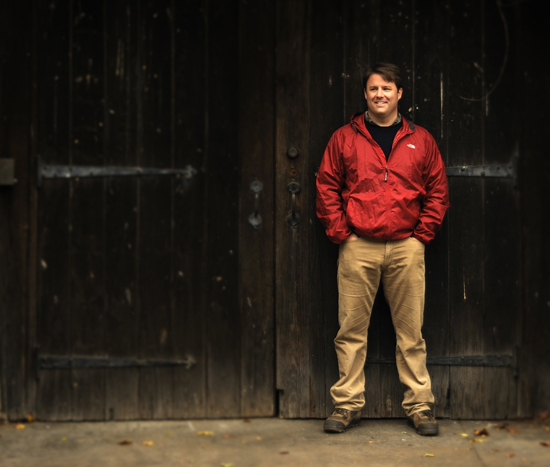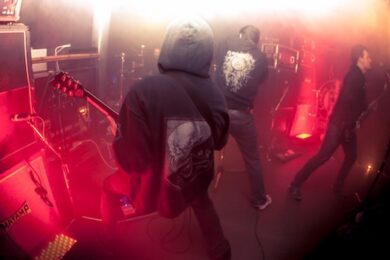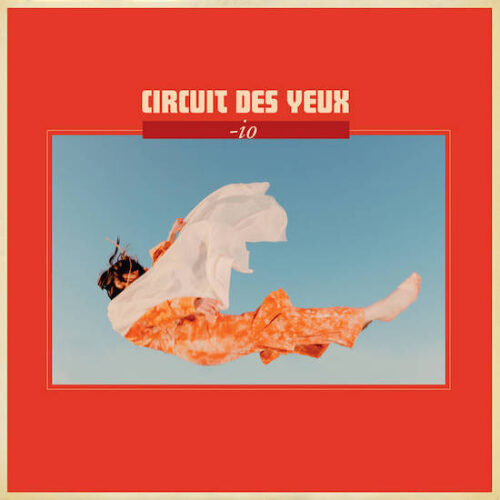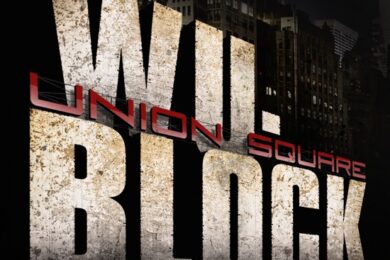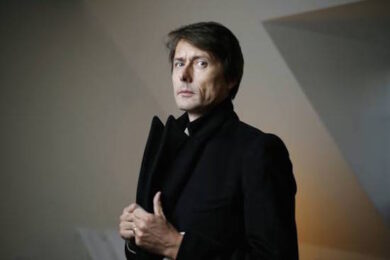“A solitary voice rises from many, so too the opposite. And a multitude of voices coalesce from one. Some doors and windows were open. And others never can be. It becomes as ephemeral as the echoes of footsteps overhead.”
Hallock Hill press release.
Hallock Hill’s second album of 2011, There He Unforeseen, diverges from the rolling, arpeggiated guitars that littered his brilliant experimental debut The Union earlier this year. Though Hallock Hill’s creator, Tom Lecky, now incorporates a wider variety of sounds into his material (including a piano and a banjo), there is somehow now more space to be found amongst the six tracks that comprise this foreboding follow-up. Where The Union was a peaceful series of flowing, deconstructed meditations, There He Unforeseen feels like its angst-ridden twin – the shadow of its brother.
Those that subscribe to Jungian psychology believe in the notion of ‘the shadow’: that which represents the repressed anger of the psyche. “Everyone carries a shadow," Jung wrote, "and the less it is embodied in the individual’s conscious life, the blacker and denser it is. In spite of its function as a reservoir for human darkness – or perhaps because of this – the shadow is the seat of creativity. The dark side of his being, his sinister shadow… represents the true spirit of life as against the arid scholar”. In relation to Freud, the shadow is the unconscious, and its desires must be fulfilled to aid the individual’s realisation of the self.
If this is true, then it becomes clear that Lecky is utilising the medium of music and non-music as a sort of purging process. This is what makes There He Unforeseen so intriguing. It’s not that it is a series of pieces of music; rather it is a chronicled evolution of the artist.
There He Unforeseen represents a shift from your work being output as musician to work as created by artist. Though The Union references memories of childhood, is it fair to say that There He Unforeseen focuses on the sounds of the adult as he is now?
Tom Lecky: The shift started off more as structural: I wanted to separate the layers of voices that formed The Union and abstract them in space. But as I went further into it, I realized something was happening. The sounds of the house and of all of us in it started to appear in the recordings. Footsteps. Chairs creaking. The house became one of the participants. For me, There He Unforeseen is very much an album about this house and the people who live in it. They appear at times in separate rooms, with distinct voices, apart and at other times together, merging, coming together. Sometimes, memories themselves enter the house and are embodied in sound.
There He Unforeseen by Hallock HillThe press release that comes with the record is far from traditional. It’s almost a short essay on your working process, but also marked by a sadness that was absent on The Union. Have you changed your working process between albums and how has that informed your work?
TL: Many of the voices seem to be stuttering, clawing or screaming. Is that sadness? I don’t know. As the person who made it, I hear exuberance, but understand that might be a weird reaction to it. I find it celebratory. Though there’s definitely a claustrophobia there that I hear now and did not recognize when making it. As for working method, it is the same: I always start off by improvising. Every part is an improvisation that gets grafted or layered. They seem composed but they aren’t. I’d say the biggest influence on the construction of it is Tim Noble’s Diffaith. I was very attracted to the sculptural quality of that album, and to how the distinct pieces were fit together.
Clawing and screaming amidst celebration sounds like a form of catharsis. With Diffaith (Welsh for ‘wilderness’) being the challenging listen that it is, was this a quality you then consciously aspired to replicate, or is it simply a shared commonality?
TL: I don’t find Diffaith challenging, only beautiful. I couldn’t try and aim for its complex structure, but learned a lot from it. A lot of There He Unforeseen comes from a more naive, innocent, child-like place.
Is this ‘child-like place’ a comfortable place to be?
TL: Absolutely. Michael Chabon’s article on the ‘Wilderness of Childhood’ was recommended to me by a close friend and it made a big impact. My childhood was free and exploratory. Perhaps it is the lack of responsibility (and at times the irresponsibility) of improvisation I’m attracted to. The tensions between exploration and the various tethers of adulthood informs a lot of what I do.
The album feels very much like two separate thematic pieces, particularly as the first three tracks run together before elements that open the album on ‘Garden’ repeat midway through the album on ‘Ligonier Point’. Can you reveal anything about the reasoning or conceptualisation of that?
TL: Everything on ‘Garden’ save the final solo guitar part appears in the other pieces, and I see it serving as an overture to the rest of the album. Those sections were removed –harvested – from their original pieces, and reconfigured. I think that this is just another way to show how voices can be fractured, recombined. New conversations are made from old.
So is each piece like a remix of these original stems of ‘Garden’? Surely this is markedly different to your approach to The Union?
TL: The other pieces came first, and ‘Garden’ was put together last. It is different from The Union in that nothing new was recorded for it: it is made out of the pieces of the pieces that follow. And the ‘found’ solo guitar piece that ends it. Whereas each piece on The Union was made as a distinct entity, everything on There He Unforeseen came from the same palette, and was intended to work together.
There He Unforeseen gets further away from The Union with the inclusion of a piano, banjo and minimal guitar work. In fact, the guitars on the album are occasionally so heavily manipulated that it’s almost not a guitar album at all. Is this because you were unhappy with some aspect of The Union, or did you just want to try this different approach?
TL: I’m not unhappy at all with The Union. I think it stands well on its own, and I’m very happy with how my process was captured in those pieces. With There He Unforeseen I needed more timbres. I don’t think it is a guitar album, but frankly I don’t think The Union is a guitar album either.
So, though The Union’s primary focus is the guitar, would you prefer to think of it as simply an album – one that isn’t focused on the instrument itself?
TL: Sure, I focus on the guitar and it is the instrument I feel most ‘comfortable’ playing. But I don’t think of myself as a guitarist. I’ve come to reject a lot of what I thought the guitar was, and what it stands for. I thought it was something I had to learn to control, how to move around on, how to command and make things happen on. I was wrong in my approach, probably because I never had the skills necessary to play it in the conventionally taught way and this is my way of making excuses! I now want it to instruct and command me, I want it to move me. I’m no longer interested in skills. I’m interested in music as action and idea, and the instrument is my way to explore those. No one would say that Yvon Chouinard’s climbs in Yosemite were ‘about’ rope and climbing gear. They were about the route chosen and the will to get through them.
I concur. With the sporadic bursts of banjo on There He Unforeseen, you seem to be digging at some recess of heritage – something that you did not explicitly allude to before. Are you expanding on the geography of Hallock Hill, and what are the implications of that?
TL: Hallock Hill is the place where I was born. Places like that take on a kind of personal mythology – one that is usually distorted. It isn’t false per se, but it is a construction. We manufacture our past each day. I’ve always thought, and this may be corny but here it is, ‘What you do with your past is as important as what you do with your future.’ How the banjo fits into all of that I have no idea. I don’t know what it implies: so I’ll have to leave that to you!
Perhaps it’s a desire for the traditional, the old, the past?
TL: I don’t want to make a fetish out of the past, or out of my sense today of what it was then. Rimbaud, in his hyperbolic way, described his own creative method as a ‘long, intimidating, immense and rational derangement of all the senses.’ I happen to like that addition of ‘rational.’ It’s so bizarre. Something is created in the present, and then it immediately exists in the past. I like being present for those moments of creation.
He also said, ‘Genius is the recovery of childhood at will.’
TL: That’s pretty incredible. And fitting. If only I were a genius!
There He Unforeseen is available now from Hallock Hill’s website
Header photo: Mark Feaster

